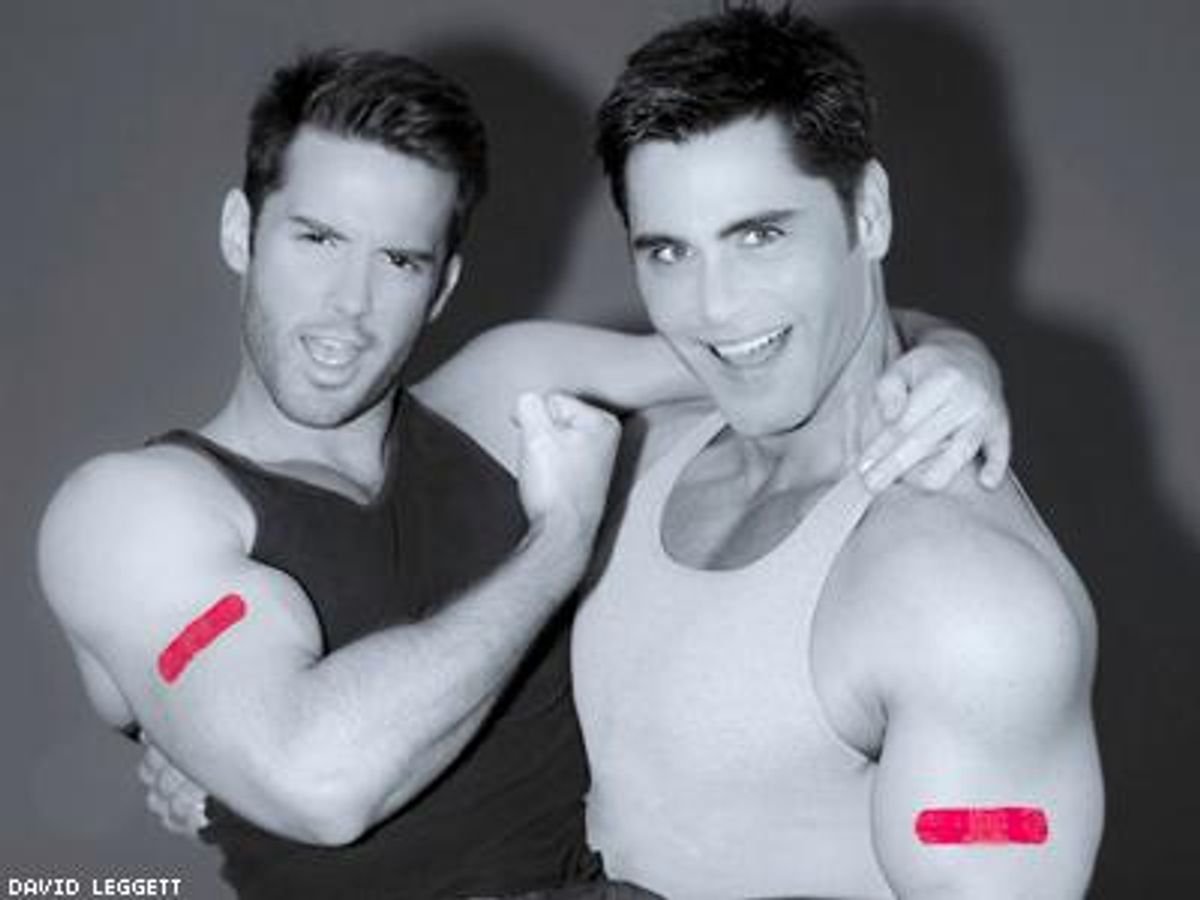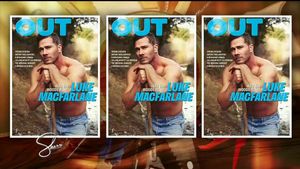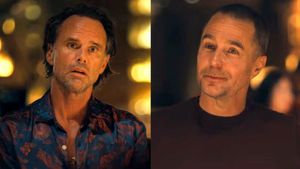It's hardly newsworthy that Jack Mackenroth isn't afraid to raise an eyebrow or two. The outspoken sex symbol activist knows how to work what he's got to raise awareness however he can--and does not apologize for it.
A simple Internet search for the scantily clad poster-boy and former reality star returned a host of images and articles that forced me to slam my laptop shut at work before lifting it up so slightly for one more peak. He was sexy, unforgiving and bold...not to mention positive. Although our resumes exhibit divergent paths (and significant lack of experience on my part), something about Jack resonated with me. There was an air of defiance in his gaze that reflected that sense of newfound insecurity in mine.
Mackenroth stayed in the forefront of my mind as I hastily jammed the keyboard in the middle of the night writing my first article. There were many factors that pushed me to write "Reluctant Social Commentary..." but the reassurance that people like him could not only stand proud, but also be exactly who they were before. In Mackenroth's case, that was the subject of most gay men's dreams. I was no Mackenroth, but at least I didn't feel ashamed to want to feel sexy anymore.
Three articles later, my feet were just getting wet as an activist when Mackenroth reached out. He had read, "HIV-Positive, Unapologetic and Fabulous," and shared it with his legions of Facebook and Twitter followers. It was an easy bond to establish and we began to exchange messages and share stories. I, the eager aspiring writer, unleashed a flood of questions onto him. Mackenroth, like a patient older brother, answered each on as they came.
While he was on a business trip in Dallas, we had the chance to get in some quality girly boy bonding time. Always staying true to fashion, our first friend-date was at the gym. We began our session of lifting heavy objects (I was leading the workout, I would like to add) and shared our HIV narratives. Jack gave me advice on how to ignore the cynics and shake off the scathing remarks. They often come as a prerequisite for an HIV activist who smiles, much less takes his shirt off. This, I was already too aware of. As he casually listed some of the horror stories he had encountered, he began to feel like an older brother give me a playful slug to the shoulder while saying, "toughen up, squirt."
Listening to his stories, I realized that is exactly what I should do... toughen up. After all, I have the luxury of living in the age where an HIV diagnosis equates to a pill a day and some dirty remarks whispered under someone's breath. Although there is a stigma that still seems to smack the teeth out of the men and women who are newly diagnosed today, that is often the worst part it.
Mackenroth was diagnosed as HIV positive in 1990. He was 20 years-old and had just recently came out of the closet. At that point he figured he had about a year to live, maybe two.
"I started taking AZT and it was rough. There were debates about whether it actually worked or made things worse. It seemed to work for me," says Mackenroth. "I figured I would just keep doing my best until I died. I was so young that I tried not to think about it and just have a little fun while I was still around."
Jack dreaded telling his mother. She was in the healthcare profession and knew all to well about exactly what an HIV diagnosis meant in the early 90's. He didn't want to worry her- a sentiment that many gay men go through when facing the question of disclosure to their parents.
Stigma is something that goes far beyond the social scene. It is something that permeates the gay culture - it is implanted in the fears of every gay man from the moment they realize they are homosexual. And one of the biggest fears of any man is letting down their mother.
"Not all gay men have HIV, Mom. I will not be one of those gay men."
In so many words, these sentiments echo through the eardrums of all gay men. As long as we can stay negative, we can be gay and somehow be just like everybody else. Mackenroth wanted to avoid having that conversation at all costs.
It wasn't until 1996, after the death of his partner Greg, that Mackenroth felt the need to tell her the truth. Mackenroth was still in good health. His body was responding well to new meds. But he could no longer avoid the fearful glare that his mother now gave him.
Mackenroth asked me, "How did your mom take it when you told her you were positive?"
I shrugged and explained that once I had reviewed all of the medical research and medication available today, she was ok. Of course, she was shaken up. She cried in her office when no one could see her. She cried in the backyard of her tree-lined suburban home in Texas. She most certainly cried when she read my first article (and most likely my second). But, just as she did was once the shock wore off after my first "coming out" experience, she no longer cries. She just nags me about keeping my insurance.
Mackenroth laughed and explained just how different his experience was. When he told his mother, there was nothing he could give her to hold on to. I was able to place my mom in a rescue boat, but he unleashed the waters of worry in her mind without so much as an old ship plank to hold on to. At that point, there was no guarantee that his life was going to last past the next Christmas.
But he had no choice. Once his partner passed away from AIDS it was the only thing left to discuss. The mother and son talked through their fears and their worries. Before Jack even uttered the words, his mother knew. And just as his partner passed from the same virus residing in him, Jack found a new hand to hold. After all, his daring, "never let them see you cry" approach to life had to come from somewhere. Who better to be his support than the one who gave him his spark for life in the first place.
Then, just like that, a cute boy walks by - one of us cracks a dirty joke - and we return to routine of picking things up and putting things down. Still, his words quietly reverberate in my head. I had been wiggling around in my new skin as an HIV positive man for less than a year - and it was starting to get comfortable. Before, Mackenroth was someone to aspire to be in the present tense. Now, I had a newfound sense of gratitude for the work he had put in to make my journey a little easier.
And by his work, I mean his relentless approach to living his life the way he wants to and not giving a damn what you think about it. Not everyone can be so bold (including me). However, men like Mackenroth are the ones who start the fire so we all can feel a little warmth.
Jack is now back in New York City and hard at work promoting his new venture, Volttage, a dating and social media site for HIV positive men, which he believes could really empower the community. I was about to speak at the local PFLAG meeting when he sent me a message about how he was taking a day off of the whole HIV activist thing.
Jack said, "It gets a little intense, you know."
Then I responded, "I was going to ask you, don't you ever want to focus on something entirely different? I love doing The Needle Prick Project, but man! I am exhausted."
He simply answered, "Yes. But people need us."
That's a big brother for you.
Just like any shot, we fear the prick of the needle. But a conversation about what it means to be HIV positive today is just the medicine we need.
Get pricked. Or Jack Mackenroth will beat you up.
TYLER CURRY created the Needle Prick Project, photographed by David Leggett, as an editorial campaign to elicit a candid and open conversation on what it means to be HIV-positive today. To learn more about The Needle Prick Project, visit Facebook.com/getpricked or follow Tyler Curry on twitter at @iamtylercurry. For more on Jack Mackenroth, follow him on twitter @jackmackenroth and visit Volttage.com












































































